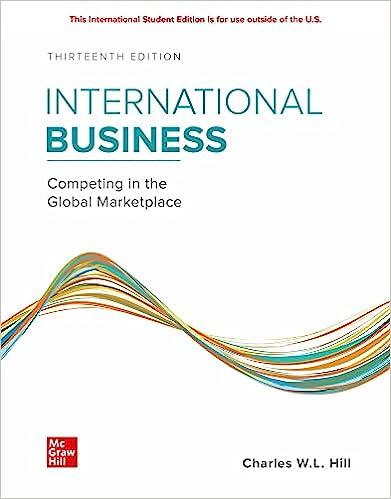Question
Muhammad bin Salman's capriciousness is hurting Saudi Arabia The Economist - Print edition | Leaders Aug 18th 2018 ELON MUSK, a mercurial entrepreneur, wants to
Muhammad bin Salman's capriciousness is hurting
Saudi Arabia
The Economist - Print edition | Leaders Aug 18th 2018
ELON MUSK, a mercurial entrepreneur, wants to take Tesla, his electric-car firm, private.
That will cost billions. Where will he find the money? On August 13th Mr. Musk gave an
answer: from Saudi Arabia, probably. It is a common refrain. When visionaries want
someone rich to back something bold, they turn to Muhammad bin Salman, the crown
prince who runs the oil-rich kingdom. He has committed $45bn to a Japanese tech fund
and plans to build an ultramodern city on the Red Sea costing $500bn. If Prince
Muhammad wants to invest in electric cars too, why not take his cash?
One reason for caution is that what the prince gives, he can suddenly take away. This
month, after Canada's foreign minister tweeted that Saudi Arabia should not lock up
peaceful dissidents—hardly an unusual statement for a Canadian politician—Prince
Muhammad was furious. Instead of ignoring the tweet, he retaliated wildly. Saudi Arabia
expelled the Canadian ambassador, cut off bilateral trade, ordered Saudi students out of
Canadian universities and told sick Saudis to shun Canadian clinics. State media
lambasted Canada's human-rights record; social media portrayed Canada as a drug-
addled dystopia. Mr. Musk, who is half-Canadian, has been warned.
Prince Muhammad's fury will not hurt Canada much. Just 0.2% of its exports went to
Saudi Arabia last year. The immediate pain will be felt by Saudi students who must
suddenly find another college and Saudi patients who must take their ailments elsewhere.
In the longer run, the main damage is to Saudi Arabia's reputation—and that has real
consequences.
Investors like predictability. Prince Muhammad offers the opposite. Last year, without
warning, Saudi Arabia led an economic blockade of Qatar that continues to disrupt trade
in the region. Months later, as part of an anti-corruption drive, hundreds of Saudi princes
and tycoons were locked up in a luxury hotel in Riyadh until they surrendered a big chunk
of their assets. No doubt some of them were guilty of something, but there was no due
process. To outsiders, it looked as if property rights in Saudi Arabia depend on the
prince's whim. In many ways, Prince Muhammad is trying to change the kingdom for the
better. He has loosened religious and social restrictions: Saudi women can now drive, and
everyone can go to the cinema. He has pursued economic reforms aimed at eventually
weaning the Saudi economy off oil, and encourages Saudi women to go out to work. All
this has made him popular, especially among the young and among
women. A reformer, but reckless Yet by doing things that are wrong and foolish, he
needlessly alienates potential supporters at home. Even as he lifted the ban on women
drivers, for example, he was locking up women who had campaigned for it. He needlessly
alienates foreigners, too. Last year the Saudi authorities detained Lebanon's prime
minister for two weeks—an extraordinary breach of diplomatic norms.
In Yemen, where Prince Muhammad is fighting a proxy war against Iran, Saudi bombs hit
a school bus on August 9th, killing dozens of children. The war, now in its fourth year, has
devastated Yemen and shamed allies such as America and Britain, which supply Saudi
Arabia with arms. Few Saudis are brave enough to tell Prince Muhammad when he is
making mistakes. His allies ought to speak up, but they are silent too. This is a grave
mistake. Saudi Arabia is the largest Arab economy and home to Islam's holiest sites.
Successful reform there would help stabilize the whole Middle East. Foreign leaders
should advise Prince Muhammad to calm down and stop damaging his country and his
reputation. If he does not, they should stop selling him weapons.
Discussion Questions
The spat between Saudi Arabia and Canada was big news in Canada in mid-August.
Research and familiarize yourself with the news story and issues and answer the following
questions.
1. There may be practical reasons for the prince to be interested in investing in new
ventures rather than just being a whimsical visionary as portrayed in the article.
What could these be?
2. What and why did Crystia Freeland tweet? Do you agree with the actions of
Canada's foreign minister?
3. The article suggests that Canada will not be impacted significantly by the prince's
actions. Is this the case? Notwithstanding, should we care about our foreign
relations with Saudi Arabia?
4. In IB can you separate business and politics?
Step by Step Solution
3.54 Rating (157 Votes )
There are 3 Steps involved in it
Step: 1
Practical reasons for Prince Muhammad to be interested in investing in new ventures could include diversifying Saudi Arabias economy away from its hea...
Get Instant Access to Expert-Tailored Solutions
See step-by-step solutions with expert insights and AI powered tools for academic success
Step: 2

Step: 3

Ace Your Homework with AI
Get the answers you need in no time with our AI-driven, step-by-step assistance
Get Started


